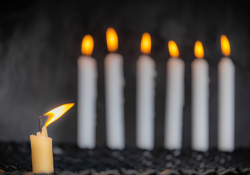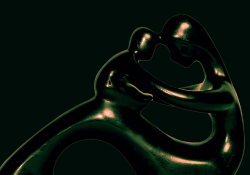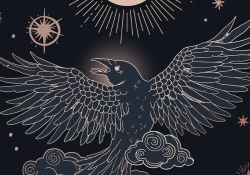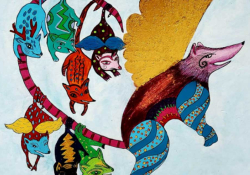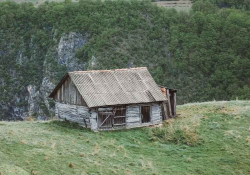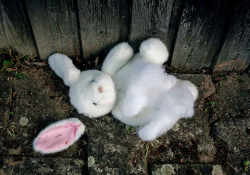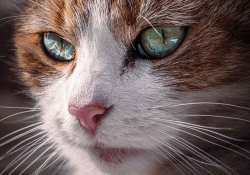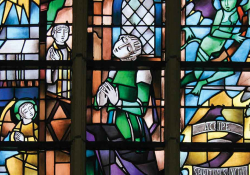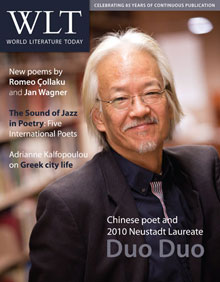First Words: "Approaching Zainab"
Zainab. Zaina-a-a-a-b. Zainab. Is it really you catching me in this muffled moment? No, you have not changed. But where is your body? You approach with your usual smile, seductive as ever, and I collapse in your embrace, forever repudiating you and the city to which you are doomed to return.
A Judas’s kiss to you, my friend. Farewell, my long awaited one. You are now a stranger on the way to Baghdad—and I shall not repent.
*
June 3: entering
We hear about the desert and think, “Oh, we know the desert, we come from the desert, we are from Iraq.” But that is a false impression. I know you know it is a false impression. For Mesopotamia is the fertile land between the two great rivers. But I did not know that. I only learned it in books that had the Leader’s picture on the first page, then Surat al-Fatihah on the next, then Surat al-Aalaq on the third. No one bothered to believe anything they were made to memorize from these books. At least I did not bother to know if anyone bothered to believe in what they memorized. At any rate, the desert existed in our hearts, despite the fertility of these texts, and that of the magic land, the powerful people and the great Leader, whom the people idolized and then toppled in a bronze image, recasting ending replicas of it ever since. The desert—any desert—is a unique experience. If you ever get a chance and you want to learn something new about life, go to the desert. But this is a contradiction, because the desert is painful. To be in a desert is to suffer. If you truly want my advice, I cannot give it. You have to find it. And if you do, it is no longer my advice.
Once you enter a desert, you never come out of it.
*
July 7
A square glass cabin. Inside, four armed men chattering in hazy dialects (Berber? Tunisian? certainly not Moroccan). Jeremy is smoking outside, silent, and I—rushing in—a conspicuous anomaly both in my womanhood and shaven scalp.
“I’d like to inquire about trips from—” I began in my hybrid Arabic, concocted both to conceal its southern Iraqi origins and to facilitate the awkward interaction.
Still indecipherable to them.
“There aren’t any,” rejoin three voices with their heads jerking upward.
“We’re not looking for a tourist cruise. We only need to make our way out of this desert to Syria.”
“Why not fly?”
“B-because we want to travel by land.”
“Where are you from?”
“Baghdad, but I was born in—”
“How old are you?” “What do you do here?” “Who’s that foreigner with you?” “Are you married?” “There aren’t any here, go back to Rabat.”
*
July 8
Midnight, plus minutes. Jeremy pretends to sleep, but I know he is watching me. A New Yorker I met two weeks ago in Fès.
We managed to find a bus to take us out of this, my only reality until now, and his temporary barbaric nightmare. I am anxious to see my childhood friends in Detroit, and Jeremy seems anxious to see something, something more immediate. I can feel his eyes scale from the tips of my toes and up to where my knees cross and perhaps even higher. He pretends to sleep, so I will pretend to write with this new mechanical pencil, new but identical and soon its newness will be forgotten and I will not be able to tell it apart from the one it came to replace. Reclining in bed. A raw friction looms in this parched Mesopotamian horizon. Shivering. How can we stay in one room and keep out of each other’s beds? Zainab would question our relation. Zainab the desirable, the strong, the calm.
Tomorrow we sail from Tangier to Genoa. He managed to arrange the deal with his standard Arabic.
*
June 3
After the sand foray, we headed back to our tent for supper. Without knowing it, the tent housed what seemed to me a cardboard image of certain scenes in Lawrence of Arabia. This film is itself a cardboard image of a scene called the East. And cardboard is often colored like sand. And our food looked like cardboard to us. No greens or colors other than the desert’s were in that delicious cuisine despite our childish expectations. That meal, as wretched as the life it fueled. Despite its deliciousness, it made you want to reject it for its heaviness and scarce hues. If it were not for the fatigue of the long journey up and down the dunes, I doubt that either of us would have eaten it as eagerly as we did, least of all Jeremy. If it were not for the drabness of the meat, and the heat of the sand that resembled it in color and temperature, I doubt that either of us would have resented it as much as we did. Resigned to our fatigue, we devoured the brown flesh—an incarnation of sand—while the desert males (equally fatigued perhaps? more hungry?) drummed on the tautly stretched skin, eliciting bestial rhythms that in turn elicited in some of us pains of pasts abandoned in a bygone Iraq, and in others a lust for a brief romance or a harmless adventure, and fixated yet others in the agony of that eternal moment. For an instant I felt pity for the refugees whose tents loomed on that shriveled horizon. How cyclopic and cyclic is their life, from the idea of one refuge to the next; how meager are their resources if you take away this imagination!
*
Perhaps in ten years, as we walk hand in hand along the paths of our endless Tigris, I will remind you of your first love poem, Zainab. Remember how you fell madly in love with a photograph? Nijinsky, 1910, dressed as the Gold Slave in Korsakov’s Scheherazade. How badly we needed to live that voluptuousness, even if only vicariously.
In love
Once more
With the dead
Like a lunatic—with the lunatic
And I, Zainab? At that time I lacked the courage to tell you how I longed to be your Zobeide. How old was War that day, Zainab? Oh, do not bother to count, because in the next phase we will only walk down foreign paths, bathed in estrangement if the snows of the West do not lull our hearts.
*
June 3
Jeremy and I may have forgotten how reading is impossible on a trip like this, when nausea is apt to overwhelm everything, including the ability to recall this fact or make use of it the next time we take a trip. But to be satiated with queasiness did not obliterate the capacity to be touched by other sensibilities. The colors of other selves asserted their presence. The more they sustained their being, the longer that nausea persisted. Our bus was on its way to Merzouga, all the way from Fès.
*
Near the cold stream we will tell each other stories. I shall speak of days of a bygone Ali whom I adored only before his eyes and yours; and you, Zainab, will recount the flooding of the Saddam Airport. You will let the horror in your eyes speak of how they electrocuted the first of the American troops on their first night on the way to invading Baghdad. No one has told me about it, you will think, because until this day the story resides within the realm of rumor. No TV or radio station has publicized it yet—but Salima did and you will. Your brother Haytham will recite endless verses of Iraqi poetry as he plunges in and out of the cold stream. Your sister Farida will tell the unofficial story of Sayyida-Zainab’s martyrdom and read al-Faatiha near al-Jawahiri’s tomb.
But who will tell the story of all the nameless soldiers, Zainab?
*
June 3
The world transformed into sand. The air was sand, the sky was sand, your own mouth was sand. Everything I could remember about you, your love, your hate, your smile, your happiness, your dreams, your homeland—everything was sand. Yet I clung to it ever so fast. Alas, there was nothing else to cling to. The world was null. From sand and unto Him we return. Even the eyes could not resist the incessant sand. For three days after the storm, sand was still gushing out of our eyes and nostrils whenever the bodily fluids were merciful enough to drive it out. Then there remained that clump of sand, stationed in the throat, censoring each and every sentiment you might wish to voice or repress, censoring you up to your frail breath of life. All was sand. A desert storm, in Marzouga or your mind or the battlefield, transforms your soul into sand.
Ali must have understood the desert storm, but he never returned to tell its story.
*
An image. An icon. Zainab. Naked. Perfectly proportioned. Brown. Untouchable.
At thirteen, you did not know whether you really wanted to traverse the kingdom of death to meet with your imagined Nijinsky or simply carried within you that visceral craving to live like all other adolescents outside of Iraq. To live, not simply survive. Either way, both desires were within the realm of the impossible during our era. Zainab, you particularly were doomed to remain Iraqi. Iraqi in every sense of the imagined identity.
Zainab, my beautiful icon, my homeland that I will not deign to touch once more, do you understand the difference between living the sanctions and observing their morbid shadows from afar?
*
June 3
I can feel it palpitating as if in my very aorta. I can see the birth of a book. How finally my English has evolved (and devolved) into a tool! How deftly I can lie about essences! Perhaps next summer when I am done with navigating old Iraqi dreams and traces of friendship and all else I will draft a story or two in my quiet exile—like Gibran!—alone in the company of books and transmuted vestiges of self.
*
We shall meet in Damascus, Zainab, because Baghdad has denounced me. The deserts of Karbala and Najaf will sanction your arduous passage, but not mine. You see the blood of Hussein, and in me they see an American infidel.
*
June 3
Not everything was sand. There was wind and sand. The wind raised our clothes higher, exposing our skin to the bombardments of a thousand sand crystals per second. Sand attacks and sand assaults and sand! sand! sand!
“I was stripped naked from the waist up. I hope no one noticed.”
“Weren’t you wearing a bra?” Jeremy inquired.
“No. Why should I? I don’t need to.”
A bit of defiance inadvertently spurted out. A jealousy intermixed with derision. All the boys fell for Zainab, for she was the one with the most attractive bosom. She did not choose to have it, nor did I choose to have mine. Yet all the same: A woman is a bag of bones, Ali used to say.
*
Last night in the minivan on the way from Naples to Taranto I pictured Iraq as a heavy rock I had finally defecated. My dream of writing Iraq was over. A momentary, unmitigated freedom. I had no people or history to talk of. I had absolutely no past that I wished to retrieve or sustain. The world owed me no stories. I am absolved of all responsibility. My nausea delivered me: here-I-am, right at this empty moment.
*
But how do I do away with Zainab and all the blood?
*
July 11
Tunis-Tunisia. Tunis-Tunisia. The capital is the country.
Third day in this city. A summer resort for a deadened Algeria. Ex-nationalists and their offspring spend their vacations here. “Just as Gulf Arabs have taken over Lebanon,” Ali would have said. The remaining week smells like a year from this sultry distance. Will I really make it to Syria to meet her? No energy or interest to get up in the morning in these filthy budget hotels, to get up and see Jeremy’s nauseating face first thing in the morning. Squalid sheets, predictable bathroom problems: faucet too low, faucet too high, sink too dirty, no trashcan, shower wets toilet paper, no toilet paper to begin with, toilet in the way of door, etc., etc.
Jeremy is getting more and more peculiar. Zainab has not replied to my message yet. Got to make it to the other side; got to give magic one more try.
Zainab, persevere.
*
The sizes of our bodies mattered not back then, for both of us could fit in the shelter your father had dug near the chicken coop. It was our home for many nights, Zainab, nights blessed by Venus and Athens and their missiles.
*
July 14
Cabin fever: when your traveling companion begins to sicken you and you begin to feel that you are leading your day in a bubble.
Time burp: when you unexpectedly see a familiar scene from your past, and in the wrong place.
I am sick of seductive old sailors and their hackneyed charms, weary of sleeping bathed in nearby blather and drizzling salt. Oh magnificent, star-studded sea sky, when do we reach Piraeus?
*
But our house was bombed twice, I used to tell you, boasting of the bonus missile your house never received. These death presents were noises from nowhere, Zainab, and to us they meant only that we did our homework in vain. There would be no school the next morning. Sometimes they also made me cry, for I would not see Ali that day.
*
July 16
To Antakia, with Jeremy and an Australian traveler we met yesterday at the nameless hostel. He went around showing other travelers what resembled a common travel book. “It’s a new travel book series, but all the countries are fake,” he excitedly told his temporary friends.
I am becoming more short-tempered and snappy with Jeremy, who manages to incite my fretfulness and critical spirit very often. He is American and I am Iraqi: why is it that only other people are voicing the oddness in this companionship? Is there something he and I are failing to scream in the face of each other?
Sometimes I think this trip is a mistake, a waste of time, a fatal glitch—like my Iraqiness and oversized hips. But not you, Zainab, not you, my perfect one.
*
Uncle Adil had dug the shelter for the family, but since I was your best friend, Zainab, and my father had not sensed the obligation to likewise dig a shelter for his family, you let me stay with you when the sirens would sound.
*
June 3
But the surface diversity shatters all resemblance when we gaze into it. And we are fond of gazing myopically. We had just made our way to the top of the sand dune when the storm started, bending our backs forward in the face of the desert, letting our noses draw nearer to the blinding surface below the turbulent sand. We had ridden to the foot of the mountain on camels. The students from Tajikistan commented that, unlike these Moroccan ones, camels in their country have two humps. Jeremy spoke to them in Arabic, the kind he learned at the Defense Language Institute. He knew how to say hump, and apparently they had picked it up from some verse in the Qur’an.
But Ali did not learn how to say hump in a second language. He failed his classes and was drafted.
*
Why do I conflate you with Nedjma, Zainab, when I have never met her? Do I reify the fictitious star or turn you into one?
*
In the West, death is stale but refrigerated. When you head to the East, if you are from there, you smell death. The East is redolent with death, but it does not always displease. There death is a scent or odor, depending on the vantage point.
I shall hate Syria, which will fill me with indifference and dust. Upon my arrival, I will be transported. With the breeze of the flat desert I shall inhale my past and savor that soothing peace one rarely finds among Caucasians. But my peace of mind will not forbear. I will hate Damascus’s dry heat, the black onions called women, the fact that I will be constipated and forbidden to wear shorts or sleeveless shirts. I will be overtaken by horror—horror that I shall not be able to explain to you, Zainab, nor will I be able to remedy it after its scorching flame abates.
Rigid freedoms and stereotyped liberties are the U.S. I will not miss, but I will not enjoy that Levantine imbecile austerity either. I shall lie defiantly naked on a filthy bed in a filthy hostel where bedroom doors do not lock, excluded, depraved, and deprived of the herd’s rhythmic sensibility, hated and terribly alone. My only solace will seem transient and fleeting. My hands, trembling, will cling to the groin and think of you, Zainab. We shall be alone, your adolescent image and my horror, and I shall look as beautiful and young as you were, for there will be no mirrors amid that squalor. And you will softly call me, “yasameen, yasameen . . .” and I shall obediently transmit your voice. Why do you seem so far away? At times loving you seems like loving a narcissistic image, a desert mirage, a naked Nedjma dancing frantically after a bloodbath.
*
July 17
A man in Marseille. An image of him, cups of past coffee, soft yellow lamplights and a painting unfinished—all in my studio, visiting me in appetite and weariness with the early morning breezes aboard this Greek ship. I loved my fleeting home in that Mediterranean haven, but I have met the desert.
*
June 3
To open my mouth was to usher a handful of sand into my entrails. I had to ask the question; the compromise was accepted.
"How long does a storm like this last?"
"What?"
"How long does a sandstorm like this laaast?"
I heard a smile but did not venture to open my eyes to see it on Jeremy’s face.
"It could last five minutes, an hour, a day, or even an entire week."
It sounded like a reasonable answer. To think of it, it was rather wise, very characteristic of desert sagacity. No chance to dispute it. The desert rules, like war. There was no question of moving at that moment. The only thing that mattered was the equation: how much air can one breathe before the lungs are completely inundated with the sand carried therewith? I turned to him, "Are we going to die of suffocation here, Jeremy?”
"We'll find out."
The usual gravity of his tone did not strike me as comic this time.
*
July 19
The end. Forty-five minutes to Zainab. The final machinations of this wondrous journey to the Mesopotamian dream are about to unfold. The Sultan Hotel, near the old Damascus railway station. Jeremy and I arrived from Latakia to this fourth floor less than an hour ago. Before napping he was subjected to my stories, which must have meant nothing or thereabouts to him. My stories of Baghdad, the joyful poverty, the imaginary amours, Zainab and her tears on the station platform outside of my bus window twelve summers ago—he tried to kiss me. Perhaps to shut me up. Otherwise, what could have sanctioned this hapless gesture in the midst of nostalgia?
*
Why was it you Ali, why you. They sent you back to your family, wrapped up in a flag, as if to deprive you not just of life, but also my horrid gaze. No, it was not you. Only your body. The desert had claimed you, and now you await me there.
*
Zainab, your tears were not matched, nor will your upcoming tears of joy in thirty-five minutes or so, nor will the ones of an oscillating despair that will arch over our farewell embraces in a week. And all I will be able to do right then is stand detached like a voyeur and smile an offish smile and tell you it is all right. I will stare at your beautiful bosom and assure myself that it is all right. Twelve years, Zainab. I cannot feel them. My notebook feels the same to me and my breathing and my hand and the coarseness of my hair and the fat around my thighs and the void between them—all have remained the same.
Rarely touched, yet torn.
*
June 3
A few minutes later, he made his grand discovery, compelled by the gravity of my question: If you stand instead of squatting, you will not have to swallow the sand! Aha! So that is why the Berber guides were skipping and frolicking in the storm while we sat pondering our last wishes, gulping down endless particles of sand. The sand kept close to the surface of the dune. We kept to our myopic vision. Of course! How could we have missed that! Everything clings to the surface of its source, let alone sand, the shrewdest of us all. How foolish to have missed that! Jeremy and I lifted our heads up. A gaze into each other’s eyes then a panoramic vision toward a vast future, with and without sand. Not many others saw that, for they were either up beyond the sand already or down, submerged under its merciless current. We smiled at each other nonchalantly: it is good to leave life to its flux. No words were needed.
*
We will meet at the heart of the Hamidiyya market, under starry vestiges of bygone French bullets. Have you been there before, Zainab? Did you lift up your head and look at that bullet-studded roof? Did the holes look like the ones lining the walls of our childhood walks back from school? Remind me Zainab, I have forgotten.
How and for how long shall we embrace? Who, besides Jeremy and your two siblings, will our spectators be? Have you aged (how awful to think of it!), have your thighs become round like mine, or did they hold onto their deceptive manliness? Do you still use lemon and olive oil and benzene to keep the luster of your long black hair? How do you smell now that you are no longer a virgin? And how do you conceal this fragrance from your father? How did the tears find your luscious cheeks? Slowly forging their way in the long interval between two abrupt wars, like two abrupt lovers who leave you with nothing but a messy groin and a sharp pain—one you cannot even locate. But they claim you, and you succumb, knowing and not knowing why.
*
It is the desert. Not the U.S. or Iraq, but the desert.
*
June 3
Then after that drab meal I reclined in the tent and thought of all the rich writing opportunities I have squandered, of the words I have misread or misspelled, of how the wonders of ordinary life are accumulating in the absence of Iraqis, and of how innocent it is for scorpions to exist in the desert, side by side with the soles of our feet. Then I lifted these feet up to join the rest of my tired body on a bed raised many inches above the ground—futile attempts to defy the inevitable. I smiled to the star-riddled sky, while secretly thinking—unbeknownst to the impulse of life in me—that the honesty of a little scorpion might somehow surmount human artifice in this distant desert.
Translation from the Arabic
By Yasmeen Hanoosh
